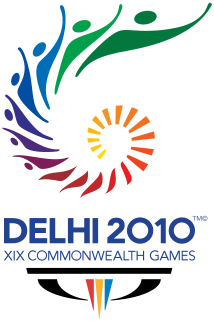
The 2010 Commonwealth Games, officially known as the XIX Commonwealth Games and commonly known as Delhi 2010, was an international multi-sport event that was held in Delhi, India, from 3 to 14 October 2010. A total of 6081 athletes from 71 Commonwealth nations and dependencies competed in 21 sports and 272 events, making it the largest Commonwealth Games to date. It was also the largest international multi-sport event to be staged in Delhi and India, eclipsing the Asian Games in 1951 and 1982. The opening and closing ceremonies were held at the Jawaharlal Nehru Stadium, the main stadium of the event.
The Padma Vibhushan is the second-highest civilian award of the Republic of India, second only to the Bharat Ratna. Instituted on 2 January 1954, the award is given for "exceptional and distinguished service", without distinction of race, occupation, position, or sex. The award criteria include "service in any field including service rendered by Government servants" including doctors and scientists, but excluding those working with the public sector undertakings. As of 2019, the award has been bestowed on 307 individuals, including twelve posthumous and 20 non-citizen recipients.
The Padma Bhushan is the third-highest civilian award in the Republic of India, preceded by the Bharat Ratna and the Padma Vibhushan and followed by the Padma Shri. Instituted on 2 January 1954, the award is given for "distinguished service of a high order...without distinction of race, occupation, position or sex." The award criteria include "service in any field including service rendered by Government servants" including doctors and scientists, but exclude those working with the public sector undertakings. As of 2019, the award has been bestowed on 1254 individuals, including twenty-one posthumous and ninety-six non-citizen recipients.
The India national football team represents India in international football and is controlled by the All India Football Federation. Under the global jurisdiction of FIFA and governed in Asia by the AFC, the team is also part of the South Asian Football Federation. The team, which was once considered one of the best teams in Asia, had its golden era during the 1950s and early 1960s. During this period, under the coaching of Syed Abdul Rahim, India won gold during the 1951 and 1962 Asian Games, with in between a fourth place at the 1956 Summer Olympics.
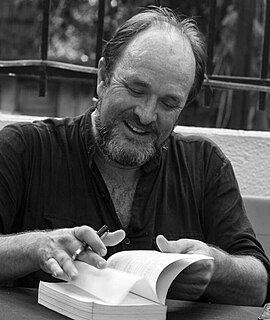
William Dalrymple is a Scottish historian and writer, art historian and curator, as well as an award-winning broadcaster and critic. His books have won numerous awards and prizes, including the Duff Cooper Memorial Prize, the Thomas Cook Travel Book Award, the Sunday Times Young British Writer of the Year Award, the Hemingway, the Kapuściński and the Wolfson Prizes. He has been four times longlisted and once shortlisted for the Samuel Johnson Prize for non-fiction. He is also one of the co-founders and co-directors of the annual Jaipur Literature Festival.

Colonel Rajyavardhan Singh Rathore AVSM, OLY is an Indian politician and former Olympian. Rathore is a Member of Parliament (MP) in Lok Sabha from Jaipur Rural seat. As of March 2019, he is the Minister of State for Ministry of Youth Affairs and Sports in the Government of India. He served in Indian Army and retired as Colonel.
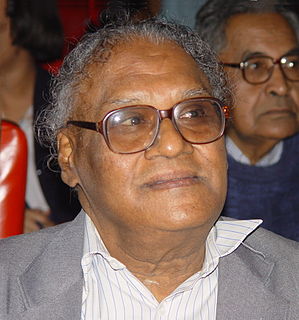
Chintamani Nagesa Ramachandra Rao FRS, also known as C. N. R. Rao, is an Indian chemist who has worked mainly in solid-state and structural chemistry. He currently serves as the Head of the Scientific Advisory Council to the Prime Minister of India. Rao has honorary doctorates from 60 universities from around the world, and has authored around 1,600 research publications and 51 books.

Hrishikesh Mukherjee was an Indian film director, editor and writer regarded as one of the greatest filmmaker of all time, known for a number of films, including Satyakam, Chupke Chupke, Anupama, Anand, Abhimaan, Guddi, Gol Maal, Majhli Didi, Chaitali, Aashirwad, Bawarchi, Kissi Se Na Kehna, Namak Haraam and Chemmeen to name a few.

India first participated at the Olympic Games in 1900, with a lone athlete winning two medals- both silver- in athletics. The nation first sent a team to the Summer Olympic Games in 1920, and has participated in every Summer Games since then. India has also competed at several Winter Olympic Games beginning in 1964. Indian athletes have won 28 medals, all at the Summer Games. For a period of time, India national field hockey team was dominant in Olympic competition, winning eleven medals in twelve Olympics between 1920 and 1980. The run included 8 gold medals total and six successive gold medals from 1928–1956.
Gagan Narang is an Indian shooter, supported by the Olympic Gold Quest. He was the first Indian to qualify for the London Olympics. He won the Bronze Medal in the Men's 10 m Air Rifle Event at the 2012 Summer Olympics in London with a final score of 701.1 on 30 July 2012.

Abhinav Bindra is an Indian businessman and retired professional shooter who is a former World and Olympic champion in the 10 metre Air Rifle event. By winning the gold in the 10 metre Air Rifle event at the 2008 Beijing Olympic Games, he became the first Indian to win an individual gold medal at the Olympic Games. It was also India's first gold medal since 1980, when the Men's Field Hockey Team won the gold. He is the first and only Indian to have held both the World and Olympic titles at the same time, a feat he accomplished by capturing the Gold Medal at the 2008 Olympic Games in Beijing, after having won the gold at the 2006 ISSF World Shooting Championships. Bindra also won the Gold Medal at the 2014 Commonwealth Games in Glasgow.

Rajagopala Chidambaram is an Indian Physicist who is known for his integral role in India's nuclear weapons program; he coordinated test preparation for the Pokhran-I (1975) and Pokhran-II (1998).
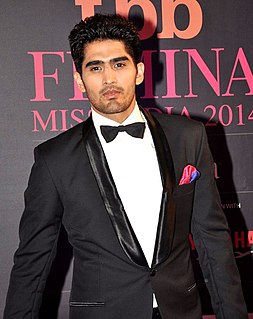
Vijender Singh Beniwal, better known as Vijender Singh is an Indian professional boxer and an Indian politician and the current WBO Asia Pacific Super Middleweight Champion and WBO Oriental Super Middleweight Champion from Kaluwas, Bhiwani district in Haryana. He was educated in his village, after which he received a bachelor's degree from a local college in Bhiwani. He practised boxing at the Bhiwani Boxing Club where coach Jagdish Singh recognised his talent and encouraged him to take up boxing. He was coached by the Indian Boxing Coach Jagdish Singh.

Virdhawal Vikram Khade is an Indian swimmer. He competed in the men's 50, 100, and 200 meters Freestyle swimming events at the 2008 Summer Olympics in Beijing, setting an Indian national record in 100 meters Freestyle. He failed to qualify for the semifinals in his events despite winning his qualification heat. Khade won a bronze medal in the 50 meters butterfly category at the 2010 Asian Games in Guangzhou; it was India's first Asian Games medal in swimming in 24 years. He was conferred with the Arjuna Award in 2011 by the Government of India.

India competed at the 2008 Summer Olympics in Beijing, People's Republic of China. India was represented by the Indian Olympic Association (IOA). A contingent of 57 athletes in 12 sports represented India, and had a support-staff of 42 officials.

Sushil Kumar Solanki is an Indian freestyle wrestler. He was competing in the 66 kg weight division when he won the 2010 world title, a silver medal at the 2012 London Olympics and a bronze medal at the 2008 Beijing Olympics, which made him the only Indian to win two individual Olympic medals. His 2008 Olympic medal was second for India in wrestling, and the first since Khashaba Dadasaheb Jadhav's bronze medal at the 1952 Summer Olympics. In July 2009, he received the Rajiv Gandhi Khel Ratna – India's highest honour for sportspersons. On 3 October 2010, Kumar handed the Queen's Baton to Prince Charles in the Queen's Baton Relay for the 2010 Commonwealth Games Opening Ceremony. Sushil won the gold medal in the 74 kg division at the 2014 Commonwealth Games.

Many different kinds of sports are played in India ranging from tribal games to mainstream sports such as football, cricket, etc., much due to India's diversity of culture, people, tribe as well as due to its colonial legacy. Hockey is the most successful sport for India at Olympics in which India has won eight Olympic gold medals. Kabaddi is the most popular indigenous sport in the country. Other popular sports in India are badminton, football, basketball, chess, shooting, wrestling, boxing, tennis, squash, weightlifting, gymnastics, athletics and table tennis. Some indigenous sports are also popular in India such as Kho-kho, Kabaddi, Leg Cricket, Fighter kite, Polo and Gillidanda among others. There are some popular sports which have originated in India such as Chess, Leg Cricket, Snooker, Kabbadi, Khido Khundi which is an ancient version of Field Hockey. India has won Olympic medals in Badminton, Wrestling, Shooting, Weightlifting, Boxing and Tennis. India has also won World Cups in Cricket, Field Hockey and Kabbadi.

Chungneijang Mary Kom Hmangte is an Indian Olympic boxer from Manipur. She is the only woman to become World Amateur Boxing champion for a record six times, and the only woman boxer to have won a medal in each one of the seven world championships. Nicknamed Magnificent Mary, she is the only Indian woman boxer to have qualified for the 2012 Summer Olympics, competing in the flyweight (51 kg) category and winning the bronze medal. She had also been ranked as No. 1 AIBA World Women's Ranking Light Flyweight category. She became the first Indian woman boxer to get a Gold Medal in the Asian Games in 2014 at Incheon, South Korea and is the first Indian woman boxer to win gold at the 2018 Commonwealth Games.
Rajah Menuri Venkata Gurusaidutt or R. M. V. Gurusaidutt or Gurusai Dutt born to RMV Bharadwaj and RM Anjana is a badminton player from India. He trains at the Hyderabad's Gopichand Badminton Academy and is supported by the GoSports Foundation, a not-for-profit organisation based out of Bangalore. He won the gold medal at the 2008 Commonwealth Youth Games and the bronze medal at the 2014 Commonwealth Games in Glasgow.
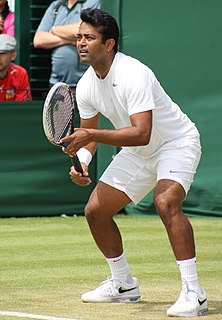
Leander Adrian Paes is an Indian professional tennis player and cobbler.

















